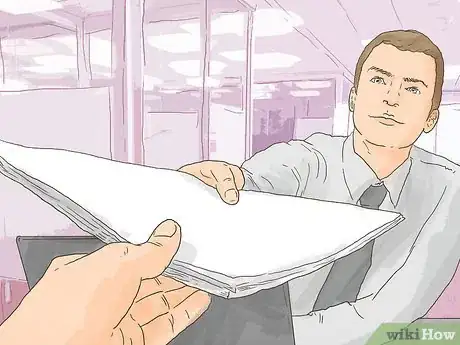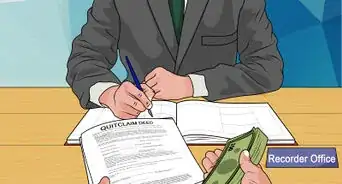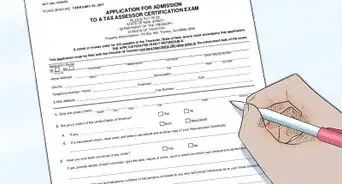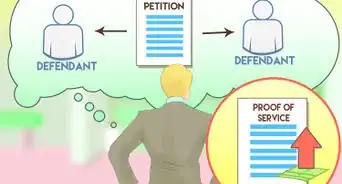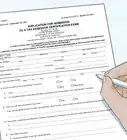This article was co-authored by Carla Toebe. Carla Toebe is a licensed Real Estate Broker in Richland, Washington. She has been an active real estate broker since 2005, and founded the real estate agency CT Realty LLC in 2013. She graduated from Washington State University with a BA in Business Administration and Management Information Systems.
This article has been viewed 148,289 times.
If you’re looking for certain property records, you actually have a couple of different options. You can either go to the appropriate government office and search for the records in person, or you can look for records online if the town or municipality has made them available that way. There are also some free and paid third-party websites that might help you find what you’re looking for. We’ll walk you through each of your options below!
Steps
Searching Property Tax Records
-
1Find the correct office. Each town or municipality should make property tax information public. In most places, the office will be the Tax Assessor’s office. To find the correct office, call city hall.[1]
- Many towns and municipalities have put their property tax records online. In the U.S., you can visit http://publicrecords.netronline.com/ to find links to government websites. Click on your state or enter your zip code.
-
2Gather helpful information. You’ll need to search for property records using any of the following information, which you should gather ahead of time:[2]
- The owner’s name.
- The property’s address. In some offices, you can search by a range of addresses, e.g., 1100-1199 Central. Most searches will not recognize the street type, such as Ave. Blvd., St., etc, so leave those out when you search.
- The parcel number. This number might be on the deed or another document and is often the most effective way to search. Keep in mind that some addresses may have more than one parcel.
Advertisement -
3Search for tax records. You might be able to search a computer or you might need to look in books. Ask someone at the office to help you find what you are looking for. Since property tax records are public, staff should be willing to help.
- The county website may not allow you to search using the owner's name. If you find the property, though, the owner's name will generally appear in the record, allowing you to verify that you have the correct property.
- If you know the street name but not the property's street numbers, you may still be able to search by inputting the street name and looking through the resulting records until you find the corresponding owner's name.
-
4Review the information contained in the record. The property tax record should contain the total tax assessed, the assessed value of the land and any buildings, and any exemptions.
Look over the information to ensure everything is included.
Finding the Property Deed
-
1Identify the county where the land is located. In the Unites States, deeds are recorded in county offices, so you first need to identify the county where the property is located.[3] If the parcel straddles more than one county, identify which county contains most of the parcel.
-
2Find out the name of the owner. You can generally search for deeds by the owner’s name. If you don’t know the name, stop into the tax assessor’s office and use the address to get the name of the owner.
-
3Visit the appropriate county office. Deeds are kept in the county Recorder of Deeds office. This office might go by another name, such as Register of Deeds or Commissioner of Deeds.[4] In some counties, the clerk of court will keep land records. Find the appropriate office by looking in your phone book or stopping into your county or city office. Ask where you need to go.
- Many counties now provide their records online. Find the website by searching for your county’s name and “Recorder of Deeds.”
-
4Search for the deed. There might be computers located at the office. In some offices, you’ll be able to get a PDF of the deed by searching on the computer. However, other offices will tell you what book and page the deed appears in. You then have to go through the leather-bound volumes to find the deed.
- Ask staff how you can get a copy of the deed. Typically, you’ll need to pay to make copies. The amount will vary by office.
-
5Review the deed. A deed will be notarized and contain a wealth of information about a piece of property. Check the following:
- The legal description of property. Generally, this will be a metes and bounds description that reads something like, “A certain tract of land situated in Piscataquis County, on the right descending bank of the Piscataquis River, north 45 degrees east 100 feet to a rock outcropping….” If the description has been recorded in a plat it will show the plat subdivision and the phase of building. A plat map will show the property boundaries and location within the subdivision, along with the length and width of the lot.[5]
- Any liens or mortgages on the property.
- Any encumbrance, such as an easement. For example, someone might have a right to use the property’s driveway.
- A lis pendens notice if the property is in foreclosure, or has another relevant lien against it.[6]
Searching Online Property Records
-
1Find real estate records. When a house is put on the market, there should be an online listing. You can use the listing to find out the price and other information, such as the year the house was built or the lot size.
- Realtor.com and Trulia.com are two well-known websites you can use for free. You can also search a real estate agent's individual website, or check on their social media accounts.
-
2Use free websites. Some websites will provide basic property information for free. Be careful. Some websites, such as peoplefinders.com, advertise “free” searches. However, they will charge you before you can access the information.
- Search for “free property records search” and carefully review the websites.
-
3Search for property records using paid websites. There are plenty of websites that gather information from counties and townships and then sell it to the public. Always research how much it will cost to run a search and just what information you will be getting.
- You can get this information yourself by stopping into the Tax Assessor or Recorder of Deeds offices. However, you might want to use a website to save you time.
References
- ↑ http://www.nolo.com/legal-encyclopedia/should-you-challenge-your-property-tax-assessment-colorado.html
- ↑ https://qpublic.schneidercorp.com/Application.aspx?App=ThomasCountyGA&Layer=Parcels&PageType=Search
- ↑ http://www.nolo.com/legal-encyclopedia/deeds-faq.html
- ↑ http://www.nolo.com/legal-encyclopedia/deeds-faq.html
- ↑ http://www.dummies.com/education/law/how-land-is-identified-in-a-deed/
- ↑ http://www.nolo.com/legal-encyclopedia/whats-the-difference-between-lis-pendens-summons-foreclosure-lawsuit.html
About This Article
You can find many property records by searching online. In the US, try searching for the zip code in the Public Records Online Directory to find a property’s tax records. Alternatively, go to the local Tax Assessor’s office and give them the owner’s name or property address. Property deeds are often available online. Try searching for “Recorder of Deeds,” with the name of the county. Or, go to the county or city office and ask where you can access physical records of property deeds. If you’re looking for the property’s value and build year, search real estate record websites, like Realtor or Trulia, or do an online search for the property address. For more tips from our Real Estate co-author, including how to find property records on paid websites, read on!


